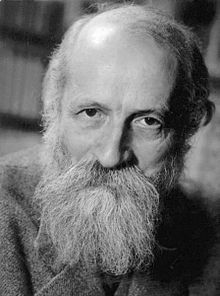Martin Buber
Martin Buber | |
|---|---|
 | |
| Born | February 8, 1878 |
| Died | June 13, 1965 (aged 87) |
| Era | Contemporary philosophy |
| Region | Western philosophy |
| School | Continental philosophers Existentialism |
Main interests | |
Notable ideas | Ich-Du and Ich-Es |
Martin Buber (Hebrew: מרטין בּוּבֶּר; German: Martin Buber; Yiddish: מארטין בובער; February 8, 1878 – June 13, 1965) was an Austrian philosopher, well-known for Philosophy of dialogue, a form of existentialism on the distinction between the I and Thou and the I-It relationship.[2]
He was born in Vienna to a Jewish family but later abandoned Jewish customs to pursue secular studies in philosophy. In 1902, he owned the daily newspaper Die Welt - the central organ of the Zionist movement, although he later withdrew from Zionist organizing activities. In 1923, he wrote Ich und Du ("I and Thou"), and in 1925 began translating Hebrew Bible into German.
He was nominated for the Nobel Prize in Literature ten times and the Nobel Peace Prize seven times.[3]
References[change | change source]
- ↑ Template:Chú thích sách
- ↑ "Island of Freedom - Martin Buber". Roberthsarkissian.com.
- ↑ "Nomination Database". Nobelprize.org. Retrieved January 24, 2017.
